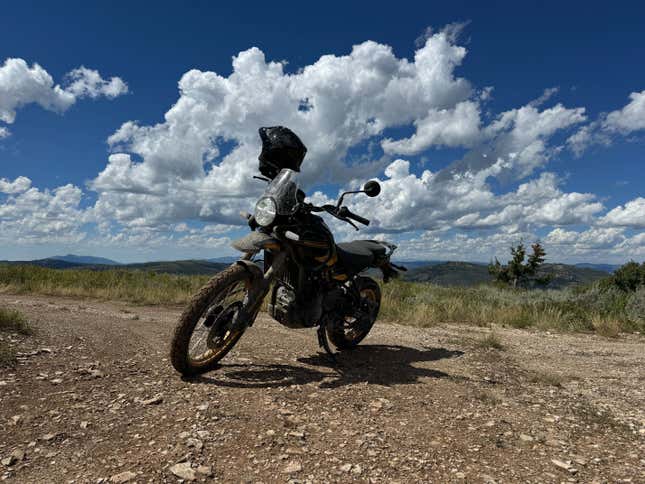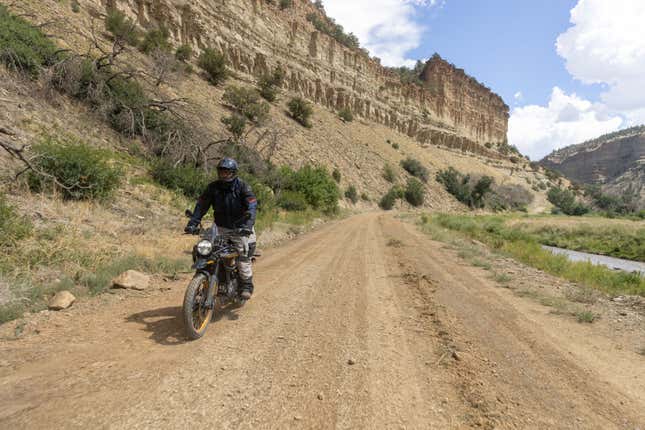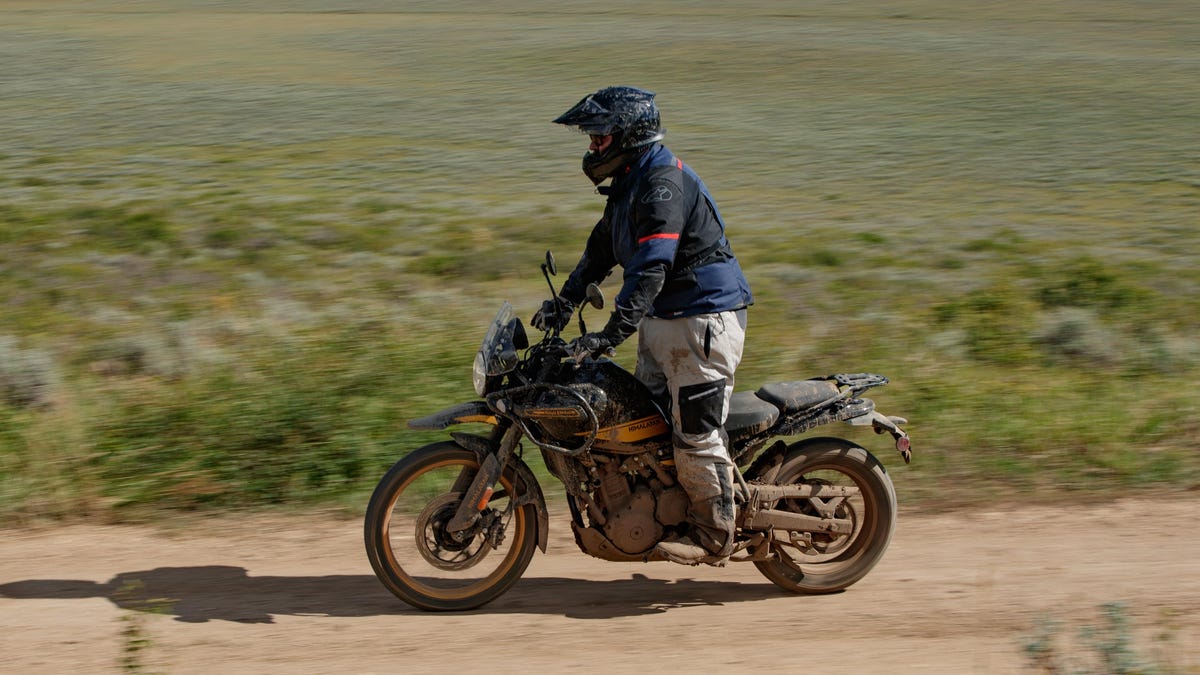Don’t ask “Are we there yet?” because we’ll all be at our desks again on Monday wishing we were out here in this shit. It’s a mantra I have to continue repeating to myself as raindrops the size and weight of heartbreak tears fall all around us. The sandy clay soil of Utah’s backcountry discovery route gains the consistency of used motor oil, and even the most seasoned of motorcyclists among us lose grip on terra solutam, and a little bit of their sanity. With water crossings galore and slippy trails difficult to walk on let alone ride a street motorcycle on, it’s a rough day in the wilderness. But that still beats a day in the office.
Full Disclosure: Royal Enfield flew me out to Salt Lake City, Utah to ride the new ground-up redesign of its Himalayan adventure motorcycle. The company paid for my travel, fed me good food, and provided me with a nice hotel room.
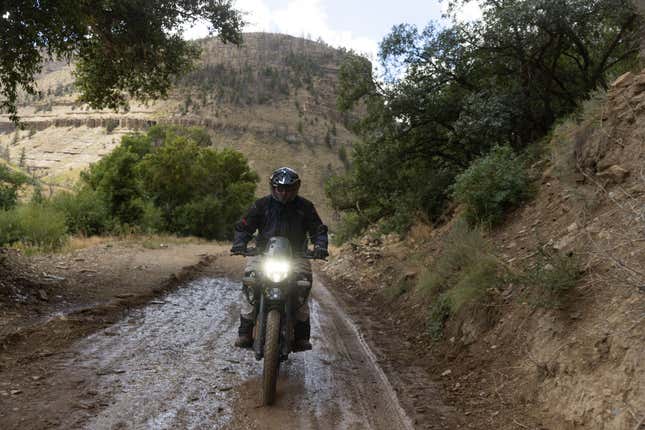
This was, without a doubt, one of the most difficult riding routes I’ve ever completed off-road, and like the lip synching duo Milli Vanilli, we can blame it on the rain. Arriving back to our far-flung lodge after a day on the Royal Enfield Himalayan 450, I was sore, stiff, muddy up to my eyeballs, and encumbered with the pain of a hard day’s travel and a long night’s bed well-earned. The unanimous conclusion among everyone who completed the sojourn, we’d have had far fewer spills and just as many thrills if the weather were dry, or if the bikes had been equipped with knobbies, take your pick. The bike was more than capable, and its tires let it down.
The outgoing Himalayan was a valiant first attempt at a bargain priced adventure bike from Royal Enfield. The little aircooled thumper had heart, and for its extremely affordable price tag it was an extremely capable motorcycle, if a bit lacking in power. The Indian brand went back to the drawing board for its second attempt and started with a clean sheet of paper. This time, the Himalayan has a brand new single-cylinder engine, the brand’s first watercooled effort, with more power, a better chassis and some seriously great engineering on a budget. If the old bike was an elderly bearded billy goat that could climb over just about anything in due course, its replacement is a fresh-faced mineral-craving ibex.
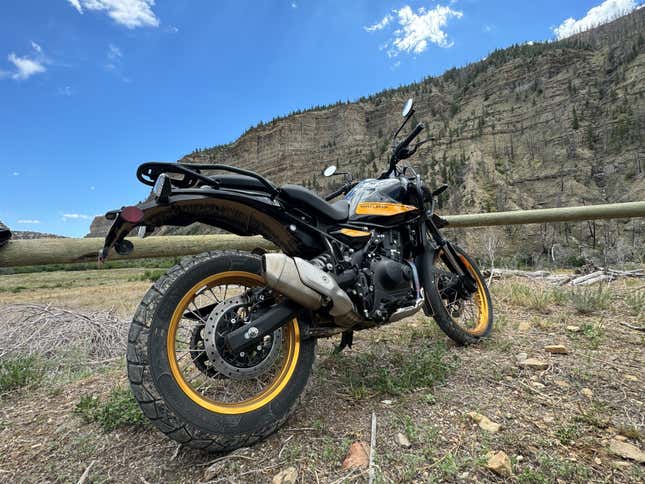
The new single-cylinder Sherpa 450 engine isn’t breaking any new ground, but with 39.5 horsepower it’s a bit more powerful than the outgoing engine’s 28. RE is rightfully proud of its new thumper. In this tall chassis, it’s now allegedly capable of 105 miles per hour at the top end, while the previous Himalayan’s 410 engine would struggle to pull at highway speeds. During the course of our ride we hit nearly 10,000 feet above sea level, and even up in the thin air, it had enough power to keep pulling up steep inclines with damn near 300 pounds of rider and gear aboard.
Visually the new bike has lost a bit of its old-school simplicity, but it’s still got the same mentality under the skin. Royal Enfield said that it imbued the bike with a “kick it straight on the side of the road” mentality. It uses simple steel where other (more expensive) manufacturers would get clever with alloys and composites. If you’re adventuring in Mongolia, you want to be able to kick is straight, or stick weld it with a battery cribbed from a passerby’s pickup.
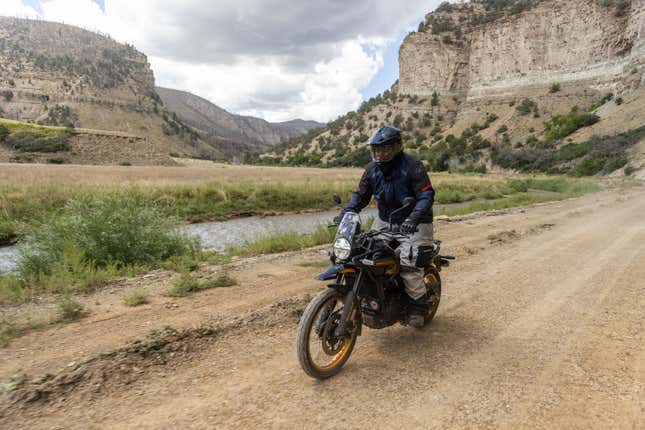
And in spite of its simple manufacturing materials, its relatively small size ensures the Himalayan weighs nearly 200 pounds less than some of the Adventure Touring segment leaders. The Himalayan is just a touch over 400 pounds, while a new BMW R 1300 GS Adventure weighs in at 593! This is a light and manageable bike on the trail, and when you inevitably drop the damn thing in the muddy rain, you won’t need a helper to lift it back up.
This is a bike that is built for everyone with three different optional seat heights to fit a number of riders, and a slim waist for improved standover height. It’s built for smaller riders to be able to hop on with ease. The air filter was kicked up on top of the engine under the fuel tank to allow the seat to sit a little lower, and the brake lights were integrated into the side markers in order to allow an extra half inch of rear wheel travel clearance. It’s a trick piece of simple engineering that makes the bike just a smidge better.
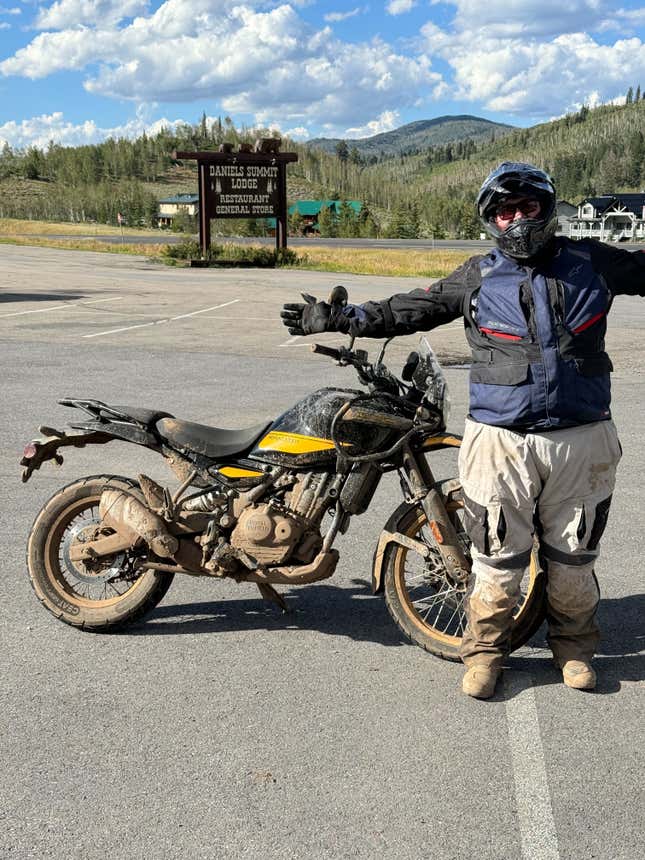
I don’t really have any big gripes about the Himalayan. At 6-foot-2-inch and built American-sized, and I found that the bike built to accomodate smaller riders still fit me pretty well. I adjusted the seat all the way up, and rotated the bars forward as high as they would go. I would have liked a two- or three-inch bar riser to bring the handlebars up a little more while I’m standing, and the pegs could have been slightly wider to accommodate my size 13 boots, but I still managed to ride all day as it was.
The new Tripper Dash is a good addition to the bike, as it’s a big round TFT digital display that can mirror from your cell phone through the RE app. Through the Tripper Dash, you can control your music, run Google Maps on the screen, or take and end phone calls while keeping your phone in your pocket or in your tank bag. In working with its customers Royal Enfield found that most Himalayan owners were using their phones on the bike already with Ram Mounts on the handlebars, or whatever, which slowly rattles your phone apart from the inside. Instead of being party to wrecking a smart phone with a four-figure price tag, or increasing the price of the bike to include an advanced computer in the dash, Royal Enfield opted to screen mirror, and I think they made the right choice.
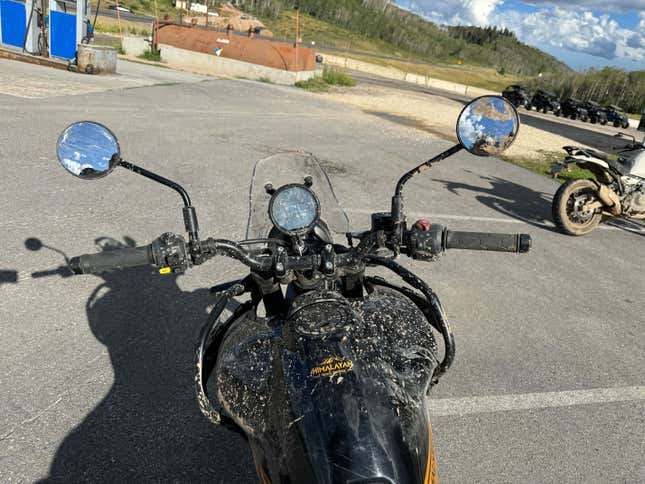
At the end of the day Royal Enfield couldn’t have predicted the weather, and if the trail had been dry all the way through, the bike would have tackled it without hesitation. It was only the most deeply rutted and wet sections that really caused trouble for us. If you’re going to be using the Himalayan as an on-road machine more often than not, the stock tire choice will get you to Starbucks just as easily as the BMW GS rider can. That tire will even get through some pretty serious adventure riding (not wet). If you are digging into the deeper sections of sand, plan to be out in inclement weather, or simply want to go a bit faster on the trails, get yourself some more aggressive knobbies and you’ll be able to go pretty much anywhere the folks on $19,000 adventure tourers can.
This bike has a starting price of $5,799, and caps out at $5,999 with optional tube wheels and tires. There’s nothing on the market at that price that will go as far as this thing. I’d be hard pressed to find anything on the used market that will compete with it. I’d definitely have this bike over a Kawasaki KLR650 or Suzuki DR 650, and that’s before taking into account that both of them cost a over a thousand dollars more than the Himalayan.
